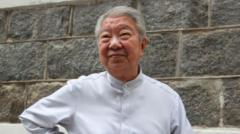Pope Francis, who died after a stroke on April 21, 2025, at the age of 88, was celebrated for his progressive views on social issues and his commitment to compassion and inclusivity within the Roman Catholic Church. His death came just a day after he blessed the crowd in St. Peter's Square for Easter, prompting an outpouring of tributes from leaders and faithful alike, emphasizing his legacy of support for migrants, the poor, and a progressive vision for the Church.
Pope Francis Passes Away at Age 88, Leaving a Legacy of Compassion and Inclusivity

Pope Francis Passes Away at Age 88, Leaving a Legacy of Compassion and Inclusivity
The world mourns the loss of Pope Francis, the first Latin American pope, remembered for his dedication to marginalized communities.
The Vatican has announced the death of Pope Francis at 7:35 a.m. on Monday, April 21, 2025, attributing his passing to a stroke that led to a coma and irreversible cardiocirculatory collapse. As the news spread, mourning crowds gathered in St. Peter’s Square, many visibly distressed, shocked by the suddenness of his death. “We saw him yesterday; we did not expect such a tragic ending,” expressed one devastated mourner.
During his twelve-year papacy, which began in 2013, Francis used his platform to champion social justice, climate action, and the dignity of migrants and those on the margins of society. His final public address resonated with themes of compassion, as he urged Catholics to embrace those “who are different” before his unexpected death.
The Vatican announced a period of mourning and plans for a public viewing of Pope Francis that could commence as early as Wednesday. Cardinal Kevin Farrell has been named as the de facto administrator of the Vatican until a new pope is elected. As tributes pour in from world leaders praising his commitment to the poor and marginalized, discussions have begun regarding his successor.
Francis is remembered not only for his global outreach but also for his internal reforms within the Church structure. He advocated for a more decentralized Church, empowering regional bishops and bringing diverse global voices into leadership positions. His influence shifted the Catholic Church towards a more inclusive and compassionate stance, emphasizing the necessity of addressing the harsh realities faced by vulnerable populations.
Reflecting on his health struggles in recent months, Francis had appeared at public events, albeit with signs of frailty, shortly after recovering from pneumonia. His death coincided with the Easter celebrations, evoking deep emotional responses from those who felt connected to his journey. “The way he lived his life through action was inspiring,” commented one attendee as they recalled his dedication to humanitarian causes.
His death sets in motion the delicate and historic process of selecting the next pope, one that must balance honoring Francis’ teachings while charting the course of the Church in a rapidly changing world. The legacy he leaves behind invokes hope for continued dialogue, compassion, and a reimagined Church that serves not just its faithful adherents but all of humanity. As reflections on his life continue, people around the world process their grief and express gratitude for the transformative impact he imparted on their lives and communities.






















